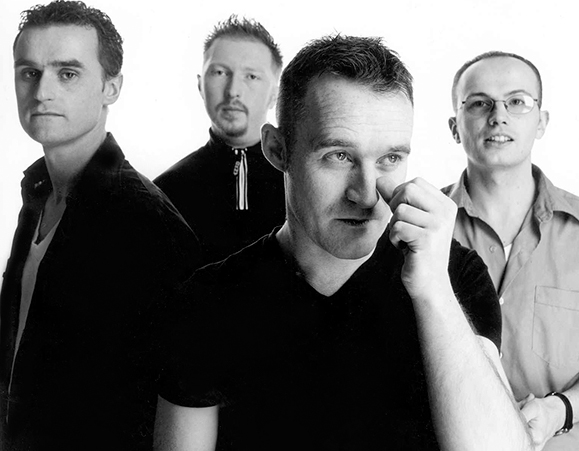Blink are back in Ireland to nail down the last few songs on what already sounds from an early demo tape like a very promising third album. After forming in 1992, the Dublin four-piece toured Britain for a couple of years but decided in ’95 to make-or-break in the U.S. “It was really starting over for us,” explains manager Aidan Lambert, whose younger brother Dermot is guitarist and lead vocalist. “We had done well in Ireland with four Top 10 hits and a Top 10 album (A Map of the Universe). We felt we’d just go for it. Besides, we thought America would be more exciting and there’s a fondness or predisposition to Irish culture and music. It’s the world’s biggest music market and Americans like live music. And they’re not afraid to express their appreciation if they like something.”
Blink’s live performances are well worth catching. Dermot Lambert brings a manic energy to the show, powerfully driven by bassist Brian McLoughlin and drummer Barry Campbell with Robbie Sexton on keyboards. Some of the early numbers – including “It’s Not My Fault,” “Cello”, or “Happy Day” – skate from high quality pop to heavy rock and that remained the range through their impressive second album The End Is High.
Lambert feels the make-or-break decision seven years ago has paid off. It’s been hard work but the American experience has been rewarding with support slots alongside Moby and The Ramones. Neither is there any mistaking the influence of their second home.
“There’s something about America that I think draws out some of the best aspects of the Irish personality,” he feels. “Audiences here value live performances when there’s effort and talent – they’ll let you know pretty quickly if they don’t see talent! – but funnily enough, American audiences have no time for people with talent who don’t make any effort.”
The Dublin band may easily be confused with a similarly named San Diego outfit, but to clear matters up the Californian band changed their name to Blink 182. The End Is High was prestigiously named Spotlight Album of the Week by Billboard magazine in 1998, but plans for two more albums were scuppered when their record label fell victim to corporate takeover and duly folded. Now the band wants to complete their third album with New York producer Howie Beno (who has worked with the Red Hot Chili Peppers), wrap it up by the end of the year and get back touring.
“We’ve been all around the U.S. – in ’98 we played over 200 gigs in the U.S. and we’ve got a solid following in the Northeast as well as places like Austin, Louisville and Buffalo,” says Lambert. “Obviously September 11 had a big impact on the whole entertainment business. The downturn had already started in March from heavy losses on the stock exchange in the dotcom sector. Apart from that though, I think there was such an emotional reaction to 9/11. The Irish-American community took it as badly as anyone else. People didn’t feel like going out for months afterwards, but the live scene is beginning to take up again around New York. Nobody will forget what happened or those who were lost, but it comes to the stage when you just have to get on with your life.”
Fans of The Waterboys will be interested to see a new release from the band – Fisherman’s Blues Part Two. It’s a series of out-takes recorded during a phenomenally productive two-year period from 1986-87 during which they put down 70 tracks of variable quality.
When the band recorded the original Fisherman’s Blues in Spiddal, Co. Galway, it marked an unexpected switch from the anthemic rock sound of This Is the Sea to a Celtic mix of folk, country, blues and even gospel. Lead singer Mike Scott recalls the experience as “a little golden age” and Fisherman’s Blues has that down home feel about it, a sort of time out with masterful local musicians from Connemara.
But while The Waterboys might have ended up sounding relaxed and eclectic, it could also be argued that this is where the band lost its way. The hotchpotch continued with the very average Room to Roam, and by the time the band split up in ’91 their best work was long behind them. Former Waterboy Kurt Wallinger broke new ground elsewhere with World Party while Scott recorded a couple of solo albums, returning to “big music” with A Rock in the Weary Land. The vocalist now revisits the 86-87 sessions and selects ten tracks for release as Fisherman’s Blues Part Two. When material is released 15 years after a recording, you’d always wonder why the songs didn’t make it in the first place. If this was quality stuff, why didn’t The Waterboys release a double-album back then? A few songs stand out – like “Custer’s Blues,” “The Ladder” and “Good Man Gone” – but others don’t, and the uninspired use of “Greensleeves” as an intro is a reminder of why “A Home in the Meadow” stayed on the shelf.
A bonus five-track CD accompanies the collection. It features a live 13-minute version of “Too Close to Heaven” to add to the 12-minute studio version already on the main record. For diehard fans this is a treat; for the uncommitted it’s self-indulgence.
Two Irish composers – David Downes and Philip Carty – have been invited to Hollywood for prestigious film scoring workshops hosted by the American Society of Composers, Authors and Publishers (ASCAP). Downes worked as musical and choral director with Riverdance on Broadway, and Carty was commissioned to compose orchestral work for the millennium. ♦


Leave a Reply